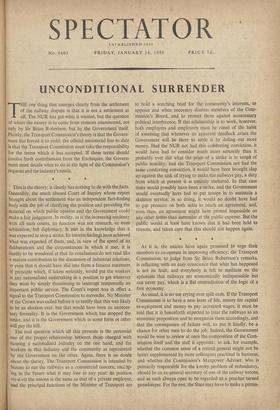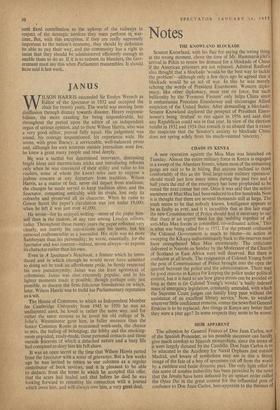As it is, the unions have again promised to urge
their members to co-operate in improving efficiency; the Transport Commission, to judge from Sir Brian Robertson's remarks, is reflecting with an easy conscience that what has happened is not its fault, and everybody is left to meditate on the aphorism that railways are economically indispensable but can never pay, which is a flat contradiction of the logic of a free economy.
As usual, it is no use crying over spilt cash. If the Transport Commission is to have a new lease of life, money for capital re-equipment and money to pay increased wages, it must be told that it is henceforth expected to treat the railways as an economic proposition and to reorganise them accordingly, and that the consequence of failure will, to put it kindly, be a chance for other men to do the job. Indeed, the Government would be wise to review at once the composition of the Com- mission itself and the staff it'appoints: to ask, for example, whether the common sense of a retired general might not be better supplemented by more colleagues practised in business, and whether the Commission's Manpower Adviser, who is primarily responsible fbr the knotty problem of redundancy, should be an ex-general secretary of one of the railway unions, and as such always open to be regarded as a poacher turned gamekeeper. For the rest, the State may have to make a perma-
nenf filed contribution to the upkeep of the railways in respect of the strategic services they must perform in war- time.. But, with this exception, if they are really supremely important to the nation's economy, they should by definition be able .to pay their way, and the community has a right to insist that they should be administered efficiently enough to enable them to do so. If it is to redeem its blunders, the Gov- ernment must say this when Parliament reassembles. It should have said it last week.



































 Previous page
Previous page